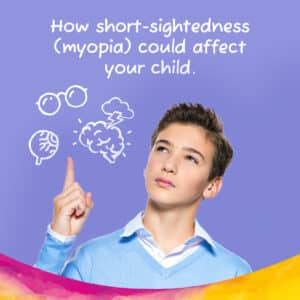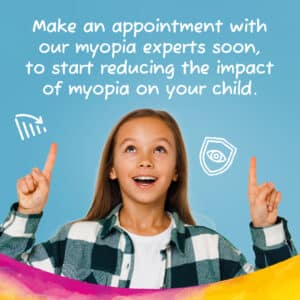Manage Myopia in Children
It is crucial to be well-informed about the rising prevalence of myopia (short-sightedness). This condition not only leads to unclear vision but also negatively impacts one’s quality of life and poses a higher risk to future eye health. To combat the rapid progression of myopia, especially among younger children, it is essential to initiate a myopia management treatment without delay.
Introducing MiSight® 1-day contact lenses, a remarkable solution that serves a dual purpose. These lenses not only correct vision impairments but also effectively alleviate the worsening of myopia, ensuring a more favourable outcome for individuals experiencing this condition.
What is short-sightedness?
Myopia, also known as short-sightedness, commonly arises when the eyeball experiences rapid growth during childhood. This condition tends to aggravate swiftly, especially among young children, as their eyes undergo accelerated development.
The prevalence and severity of myopia are on a steady rise, with projections indicating that it will affect more than half of the global population by 2050. Myopia leads to blurred vision and typically necessitates the use of glasses or contact lenses to perceive details, such as those on a whiteboard or television screen.
As myopia progresses, there is an increasing dependence on visual aids for everyday tasks, further heightening the potential risks to long-term eye health.
Why is this happening?
Myopia, also known as near-sightedness, is a condition that affects many individuals worldwide. It is believed that modern lifestyles and increased screen time are contributing factors to the rising prevalence of myopia. With the advent of technology, people are spending more time engaged in near-vision activities such as reading, writing, and using electronic devices.
This increased screen time can strain the eyes and potentially lead to the development of myopia. Furthermore, the decreasing amount of time spent outside due to urbanization and educational demands may also contribute to the development of myopia.
However, it is important to note that genetics also play a significant role in the development of myopia. Some individuals may be genetically predisposed to the condition, making them more susceptible to developing myopia, regardless of their lifestyle or environment.
Therefore, it is crucial to address both environmental factors and genetic predispositions when considering the causes and prevention of myopia.
How myopia affects your child today?
As the severity of myopia increases, it can significantly impact one’s overall quality of life. This is particularly true for children, as they become more reliant on corrective measures to actively participate in everyday activities such as school, sports, and other essential tasks.
The potential long-term consequences of myopia should not be underestimated, as they can lead to more severe eye health issues in the future. These complications may include myopic maculopathy, retinal detachment, glaucoma, and cataracts.
It is worth noting that myopia tends to progress at a faster rate in younger children. Therefore, it is crucial to initiate appropriate treatment as soon as possible to mitigate its advancement.
Fortunately, there are proactive steps you can take to slow down the progression of your child’s myopia. By taking action now, you can help safeguard their vision and improve their long-term eye health.
Spot the signs of short-sightedness.
- Headache
- Tired eyes
- Regularly rubbing your eyes
- Needing to sit close to screens, such as the TV
- Struggling to see the whiteboard from a distance
Tips and tricks to help your eyes
- Go outside! From going to the park to riding your bike, looking at objects far away in the distance gives your eyes a chance to relax.
- Screen-free time! All that time spent in front of bright screens can strain your eyes. It is time to step away from the tablet. and the computer, and the TV, oh, and your smartphone too. Sorry. Your eyes will thank you!
- Keep objects at a distance. We know it is tempting to curl up close to your screen, but there is some evidence that this could increase the chance of short-sightedness. We suggest keeping devices and books at least the same distance from your knuckle to your elbow. Go on, give it a try!
- Special myopia management contact lenses and glasses Did you know you can get special contact lenses and glasses that not only help you to see clearly but can slow down how quickly your sight may change? Your optometrist can chat with you about this and explain how they work.
- Soak up the sleep. Having a good quality night’s sleep can help with myopia, so make sure you are getting enough shut eye.
What about your child’s future?
Effective management techniques are readily available to address myopia, allowing individuals to pursue a diverse range of captivating endeavours in the future. Whether one aspires to excel as a professional athlete, delve into the realm of astrophysics, or engage in compassionate caregiving, myopia need not hinder these aspirations.
Book regular eye exams.
As you age, your eyes undergo a continuous evolution, much like the growth experienced with each passing birthday. Ensuring regular eye examinations becomes vital for detecting any alterations that may pose challenges to your vision as well as maintaining the long-term health of your eyes.
Should you observe any modifications in your visual perception as you progress through life, it is imperative to communicate these changes to a responsible adult.
By promptly identifying shifts in your eyesight, you afford your trusted optometrist the opportunity to provide timely intervention and effective management strategies.
Book an eye exam with us today!
Options for your child
If your child has been diagnosed with myopia, there are some clinically effective options that can slow the worsening of myopia. Discuss the best option for your child with your eye care professional.
Dual-focus myopia management: MiSight® 1-day contact lenses
- One-day soft contact lenses, which are worn during the day
- Ideal for active children
- Clinically proven for children aged 8+
- Feel more competent when taking part in sports and other physical activities.
Myopia management glasses and lenses
- Worn during the day
- A good choice if your child diligently wears their glasses
- Ideal for younger children
Orthokeratology contact lenses
- Hard contact lenses worn overnight
- Lens-free during daytime
- Ideal for children who frequently enjoy swimming and water sports where glasses and soft contact lenses may not be suitable.
Manage Myopia in Children with Bill Opticians
In conclusion, as we continue to see a rise in myopia among children, it is crucial to take proactive steps towards managing and treating this condition. With the introduction of innovative solutions like MiSight® 1-day contact lenses, we now have a tool to not only correct vision impairments but also slow down the progression of myopia.
It is important to stay informed and take the necessary measures to ensure a better future for our children’s eye health.
Let us work towards reducing the prevalence of myopia and creating a brighter tomorrow for our younger generations.
Book an appointment with us today to get your child tested!


